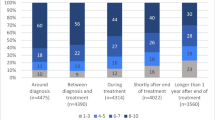Abstract
To determine the prevalence of posttreatment patient requests for health information from Chinese cancer patients during their recovery period, a cross-sectional, descriptive study using a mailed survey was conducted among 374 patients selected randomly. The survey addressed what types of information patients actually wanted but did not receive from their care providers. Questionnaires from 360 patients were received and analyzed. Approximately 76.0 % of the patients did not receive health information and expressed the need for the information. The information about how to reduce emotional distress (90.1 %), rehabilitation (76.2 %), disease symptoms (59.3 %), and nutritional support (56.8 %) were paramount among patients’ concerns. Only 12.8 % hoped to acquire information on sexual health. Health information for cancer patients at the recovery stage in China is poor. A tripartite involvement of the hospital–family–community and the combined intervention related to physical sequelae and psychosocial factors are needed at the recovery stage.
Similar content being viewed by others
References
Lin K, Shen W, Shen Z, Cai S, Wu Y (2003) Estimation of the potential for nitrosation and its inhibition in subjects from high- and low-risk areas for esophageal cancer in southern China. Int J Cancer 107:891–895
Lin K, Shen W, Shen Z, Wu Y, Lu S (2002) Dietary exposure and urinary excretion of total N-nitroso compounds, nitrosamino acids and volatile nitrosamine in inhabitants of high- and low-risk areas for esophageal cancer in southern China. Int J Cancer 102:207–211
Lin K, Shen Z, Lu S, Wu Y (2002) Intake of volatile N-nitrosamines and their ability to exogenously synthesize in the diet of the inhabitants from high-risk area of esophageal cancer in southern China. Biomed Environ Sci 15:277–282
Eakin EG, Surycker LA (2001) Awareness and barriers to use of cancer support and information resources by HMO patients with breast, prostate, or colon cancer: patient and provider perspectives. Psychooncology 10:103–113
Fawzy FI, Fawzy NW, Arant LA, Pasnau RO (1995) Critical review of psychosocial interventions in cancer care. Arch Gen Psychiatry 52:100–113
Guidry JJ, Aday LA, Zhang D, Winn RJ (1997) The role of informal and formal social support networks for patients with cancer. Cancer Pract 5:241–246
Matthews BA, Baker F, Spillers RL (2004) Oncology professionals and patient requests for cancer support services. Support Care Cancer 12:731–738
Montazeri A, Vahdani M, Haji-Mahmoodi M, Jarvandi S, Ebrahimi M (2002) Cancer patient education in Iran: a descriptive study. Support Care Cancer 10:169–173
Fawzy FI (1999) Psychosocial interventions for patients with cancer: what works and what doesn’t. Eur J Cancer 35:1559–1564
Gruman J, Rovner MH, French ME, Jeffress D, Sofaer S, Shaller D (2010) From patient education to patient engagement: implications for the field of patient education. Patient Educ Couns 78:350–356
Krupnick JL, Rowland JH, Goldberg RL, Daniel UV (1993) Professionally-led support groups for cancer patients: an intervention in search of a model. Int J Psychiatry Med 23:275–294
Treacy JT, Mayer DK (2000) Perspectives on cancer patient education. Semin Oncol Nurs 16:47–56
Leslie K, Curtis M, Lunn D (2003) Education to achieve symptom control for patients with cancer. Nurs Times 99:34–36
de Wit R, van Dam F, Zandbelt L, van Buuren A, van der Heijden K et al (1997) A pain education program for chronic cancer pain patients: follow-up results from a randomized controlled trial. Pain 73:55–69
Champman K, Rush K (2003) Patient and family satisfaction with cancer-related information: a review of the literature. Can Oncol Nurs J 13:107–116
Pelusi J (2006) Sexuality and body image: research on breast cancer survivors documents altered body image and sexuality. Am J Nurs 106(3 suppl):32–38
Grassi L, Malacarne P, Maestri A, Ramelli E (1997) Depression, psychosocial variables and occurrences of life events among patients with cancer. J Affect Disord 44:21–30
Cumbo A, Agre P, Dougherty J, Callery M, Tetzlaff L et al (2002) Online cancer patient education: evaluating usability and content. Cancer Pract 10:155–161
Zeltzer LK, Chen E, Weiss R, Guo MD, Robison LL et al (1997) Comparison of psychologic outcome in adult survivors of childhood acute lymphoblastic leukemia versus sibling controls: a cooperative children’s cancer group and national institutes of health study. J Clin Oncol 15:547–555
Hautamäki K, Miettinen M, Kellokumpu-Lehtinen PL, Aalto P, Lehto J (2007) Opening communication with cancer patients about sexuality-related issues. Cancer Nurs 30:399–404
Ananth H, Jones L, King M, Tookman A (2003) The impact of cancer on sexual function: a controlled study. J Palliat Med 17:202–205
Fincham L, Copp G, Caldwell K, Jones L, Tookman A (2005) Supportive care: experiences of cancer patients. Eur J Oncol Nurs 9:258–268
Penson RT, Talsania SH, Chabner BA, Lynch TJJ (2004) Help me help you: support groups in cancer therapy. Oncologist 9:217–225
Chou HL, Liaw JJ, Yu LH, Tang WR (2007) An exploration of life attitudes in patients with nasopharyngeal carcinoma. Cancer Nurs 30:317–323
Fawzy FI, Fawzy NW, Arndt LA, Pasnau RO (1995) Critical review of psychosocial interventions in cancer care. J Arch Gen Psychiatry 52:100–113
Acknowledgments
The authors wish to thank the participants for their time and interest. We appreciate the executive and support from the chair Prof. Irene Quek Kim Ngoh, Sir Yuebing Wen, and Prof. William W Au. The study was supported by grants from the research project of science and technology of Guangdong Provincial Health Office (A2005460), Science and Technology Planning Project of Guangdong Province (2011B031800151), Development Program Foundation for Major Subject of Guangdong Province “211 Project” (second phase), and Guangdong Provincial Key Laboratory of Infectious Diseases and Molecular Immunopathology, China.
Conflict of Interest
The authors declare that they have no competing interests.
Ethical Approval
Approval for this study was provided the Research Ethics Board in the Affiliated Cancer Hospital, SUMC (STFZ [2003] 2H).
Author information
Authors and Affiliations
Corresponding author
Additional information
Wei-Li Qiu and Kun Lin contributed equally to this study.
Rights and permissions
About this article
Cite this article
Qiu, WL., Lin, PJ., Ruan, FQ. et al. Requests for Health Education from Chinese Cancer Patients During Their Recovery Period: a Cross-Sectional Study. J Canc Educ 28, 428–434 (2013). https://doi.org/10.1007/s13187-013-0482-0
Published:
Issue Date:
DOI: https://doi.org/10.1007/s13187-013-0482-0



